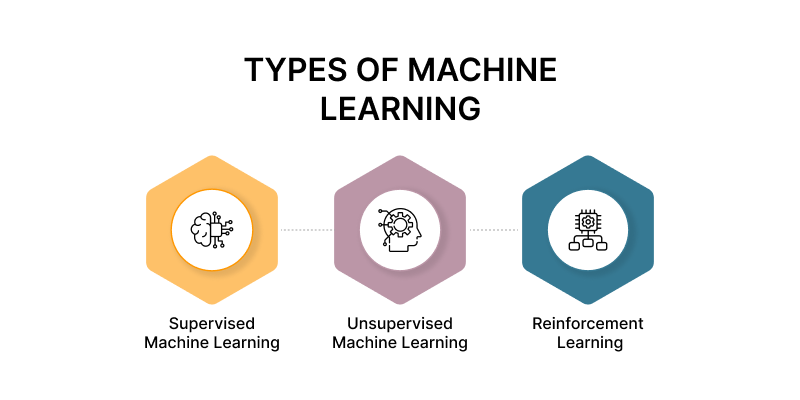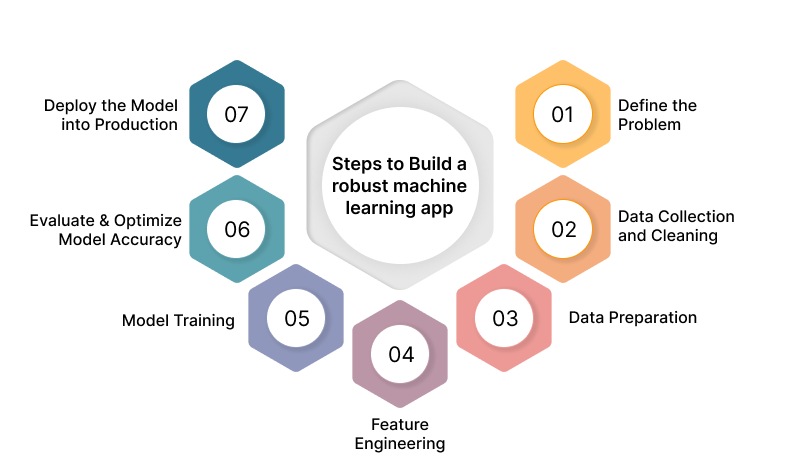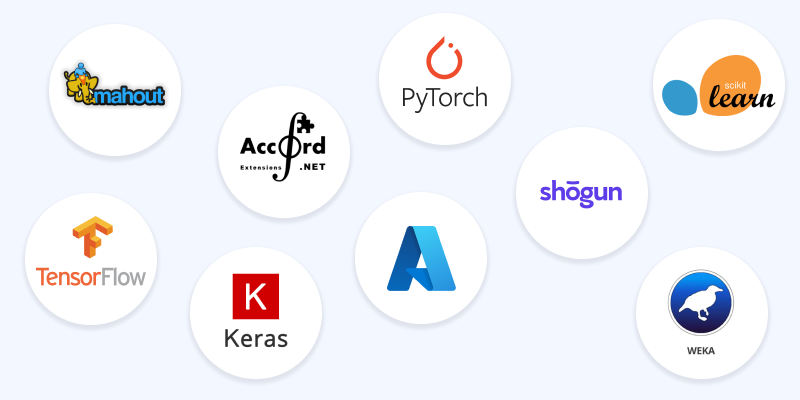Using Machine Learning in Mobile App Development
Introduction
Machine learning (ML) is transforming mobile app development by enabling apps to learn from user behavior, adapt to preferences, and offer personalized experiences.
Unlike traditional programming, where actions are explicitly coded, ML allows apps to improve and make decisions based on data patterns.
Compatibility of machine learning with a few tech frameworks is another advantage for automating certain tasks for building a mobile app.
This technology is increasingly popular in mobile apps, from predictive text and voice assistants to personalized recommendations and real-time translation.
By integrating ML, developers can create smarter, more efficient apps that enhance user experiences and stay competitive.
Apart from the information mentioned below, if you're looking for information on real-time mobile app developers, we have a list of companies to help you with mobile app development.

Transforming Mobile Apps with ML: A New Era of Functionality
Machine learning is ushering in a new era of functionality for mobile apps, transforming them from simple tools into intelligent, adaptive systems.
With ML, mobile apps can analyze vast amounts of data, recognize patterns, and make informed decisions without human intervention.
This capability opens up endless possibilities, from apps that can predict user needs and provide personalized recommendations to those that can automate complex tasks.
As a result, mobile apps are becoming more intuitive and responsive, offering users a seamless experience that feels almost like a personal assistant.
This shift is not just a technological advancement but a fundamental change in how we interact with mobile devices, making them more integral to our daily lives.
Types of ML algorithms used in Mobile App Development (Android and iOS Apps)

Machine learning algorithms play a crucial role in enhancing mobile apps, making them smarter and more user-friendly. Here's a look at the different types of ML algorithms commonly used in Android and iOS app development:
Supervised Learning:
Supervised learning algorithms learn from labeled data, where each example is paired with a target response or output.
For instance, in a mobile app that categorizes images, the algorithm is trained on a dataset where each image is labeled (like “cat” or “dog”).
Once trained, the algorithm can accurately predict the label for new, unseen images.
This type of learning is widely used in applications such as speech recognition, email filtering, and fraud detection.
Unsupervised Learning:
Unlike supervised learning, unsupervised learning algorithms work with data that has no labeled responses.
The algorithm analyzes the data and identifies patterns or groupings on its own.
For example, in a mobile app that organizes photos, an unsupervised learning algorithm might automatically group similar images without being told what the images represent.
This approach is useful for clustering, anomaly detection, and recommendation systems.
Reinforcement Learning
Reinforcement learning algorithms are designed to make decisions by interacting with an environment.
The algorithm learns through trial and error, receiving feedback in the form of rewards or penalties based on its actions.
This method is often used in mobile games or apps that require strategic decision-making, where the algorithm adapts over time to provide better results.
For example, in a mobile app that suggests the best route for navigation, a reinforcement learning algorithm could learn to optimize routes based on traffic patterns and user preferences.
Features of using ML in Mobile app development
Using machine learning in mobile app development offers several powerful features:
Personalization
- Tailored content and recommendations to individual users based on their behavior and preferences.
- Examples: Personalized music playlists, news feeds, and shopping recommendations.
Enhanced User Experience
- Improves app usability with features like voice recognition, image recognition, and natural language processing.
- Examples: Voice assistants, photo filters, and chatbots.
Predictive Analytics
- Analyzes user data to predict future behavior and trends.
- Examples: Integration of AI with IOT for Predictive text input, health monitoring apps, and financial forecasting.
Automation
- Automates repetitive tasks, reducing the need for manual intervention.
- Examples: Automated customer support, email sorting, and task scheduling.
- An automated chatbot for your e-commerce app is a great example of how one can leverage the rich mobile-based AI library to make the most out of machine learning fundamentals.
- If you're looking for such resources for your mobile apps, consider outsourcing chatbot development from a list of companies that can help you build an automated chatbot.
Improved Security
- Enhances security features through anomaly detection and fraud prevention.
- Examples: Biometric authentication, fraud detection in financial apps, and secure transactions.
Real-Time Data Processing
- Process data in real-time to provide instant feedback and actions.
- Examples: Real-time language translation, live traffic updates, and dynamic pricing.
Enhanced Search Capabilities
- Improves search functionality with better context understanding and relevance.
Process of Using ML for Mobile app development

Integrating machine learning (ML) into mobile app development involves several key steps:
1. Define the Problem
- Begin by clearly defining the objectives of your machine learning app. Understand the specific business challenges it will address.
- This step should also involve identifying the key metrics for success and considering potential risks or limitations that could impact the project's feasibility.
2. Data Collection and Cleaning
- Collect data from various sources, ensuring it is relevant to the problem at hand.
- After gathering the data, clean it by removing any irrelevant, duplicate, or missing entries.
- Additionally, consider how to handle any biases or inconsistencies in the data to improve model accuracy.
3. Data Preparation
- Convert the cleaned data into a format suitable for machine learning, such as numerical values for text or image data.
- Also, consider normalizing or scaling the data to ensure consistency and better model performance.
4. Feature Engineering
- Create new features from existing data to enhance the model's predictive power.
- Evaluate the importance of each feature and consider eliminating those that do not contribute significantly to the model’s accuracy.
5. Model Training
- Divide the data into training and evaluation sets.
- Train the machine learning model using the training data, and fine-tune hyperparameters like learning rate and regularization to optimize performance.
- Additionally, consider using cross-validation to ensure the model generalizes well to new data.
6. Evaluate and Optimize Model Accuracy
- Assess the model’s performance using various accuracy metrics.
- If issues like overfitting or underfitting arise, consider refining the model architecture or adjusting the training process to improve results.
7. Deploy the Model into Production
- Integrate the trained model into your app for real-world use. Ensure that the deployment process includes monitoring tools to track the model’s performance over time and make adjustments as necessary.
- Also, consider the scalability of the model to handle varying loads in a production environment.
Key Considerations in Machine Learning App Development
Data Quality
- The success of your machine learning model hinges on the quality of the data you use.
- Ensure that the data is clean, relevant, and ample to train effective models.
Model Selection
- Selecting the right algorithm is crucial.
- The choice should align with the specific problem, data type, and accuracy requirements of your app.
User Privacy and Data Security
- Protecting user data is paramount.
- Implement strong security measures to ensure compliance with privacy regulations and safeguard sensitive information.
Continuous Learning and Improvement
- Machine learning models need to adapt over time.
- Set up a system for continuous updates and improvements as new data becomes available, keeping your app effective.
Deployment and Monitoring
- When deploying models into production, include monitoring tools to track performance and detect any issues, ensuring the model remains reliable and accurate.
The approach of Machine Learning in Mobile App Development
1. User-Centric Design
- Focus on how machine learning can enhance user experience and address specific needs.
- Incorporate features that provide personalized recommendations or improve interaction based on user behavior and preferences.
2. Integration with Existing Features
- Seamlessly integrate machine learning functionalities with existing app features.
- For example, use ML to enhance search capabilities, improve content recommendations, or optimize user engagement without disrupting the app's core functions.
3. Performance Optimization
- Prioritize optimizing machine learning models for mobile devices, which often have limited computational resources.
- Employ techniques like model quantization or pruning to ensure efficient performance and quick response times.
4 . Real-Time Processing
- Leverage machine learning to provide real-time insights and interactions.
- For instance, use on-device processing for tasks like image recognition or natural language processing to deliver instant results without relying on server-side computations.
5. Adaptability and Personalization
- Implement models that adapt to user behavior and preferences over time.
- Use machine learning to continuously refine and personalize user experiences based on evolving data, ensuring the app remains relevant and engaging.
6. Testing and Validation
- Regularly test and validate machine learning models to ensure their accuracy and effectiveness in real-world scenarios.
- Employ techniques such as A/B testing and user feedback to refine models and improve overall app performance.
Tools and Technologies for Machine Learning App Development

TensorFlow
- One of the renowned frameworks included in both & python libraries.
- A widely used platform for machine learning that helps developers create and train models with a comprehensive set of libraries and tools.
- It supports both deep learning and traditional machine learning tasks.
PyTorch
- A popular framework for developing deep learning models.
- PyTorch supports on-device processing, allowing developers to create models that function without a server connection, making it ideal for mobile applications.
Scikit-learn
- A versatile Python library offering a range of tools and algorithms for building and implementing machine learning models.
- It is well-suited for tasks such as classification, regression, and clustering.
Keras
- An easy-to-use API that simplifies the rapid prototyping and development of machine learning models.
- Keras integrates well with TensorFlow and other backend engines, providing a user-friendly interface for model development.
Microsoft Azure
- A cloud-based platform that offers visualization tools and services to assist users in creating, training, and deploying machine learning models.
- It provides a comprehensive environment for developing and managing machine learning projects.
Apache Mahout
- An open-source tool that includes algorithms for regression, clustering, recommendation, and distributed linear algebra, making it useful for building scalable machine learning applications.
Weka
- A collection of machine learning tools and libraries designed for natural language processing and other tasks.
- Weka offers an intuitive interface and a variety of algorithms for model building.
Shogun
- A tool that implements standard machine learning methods and is valuable for both education and development purposes.
- Shogun provides a range of algorithms and is known for its efficiency.
Accord.NET
- A free and open-source machine learning framework that is suitable for commercial use. Accord.NET offers a range of tools for computer vision, machine learning, and pattern recognition.
- Acoord.NET offers C# bindings. By using these, developers can take advantage of powerful deep learning directly in C# for mobile applications.
- You can always consider outsourcing .NET development-specific projects from a pool of top talent of mobile app developers around the globe.
Why Is The Integration of Machine Learning in Android apps growing?
Machine learning (ML) is increasingly integrated into Android apps due to its ability to enhance user experiences with personalized features and real-time insights.
ML improves app efficiency by automating tasks and optimizing performance, and advancements in mobile hardware support complex on-device processing.
By leveraging user data, ML offers targeted functionalities and robust security features.
Frameworks like TensorFlow Lite and PyTorch Mobile simplify integration, giving apps a competitive edge in a crowded market.
Overall, ML is revolutionizing Android app development by making apps smarter and more responsive.
The entire app development project if outsourced from a country with a cheaper labor cost, can save you a lot on viable company resources.
India is one such country wherein you can hire mobile app developers at a reasonable price, to know more refer to a complete breakdown of all costs you will incur for app development in India
If you're looking for a specific reason to choose India as your alternative to hiring mobile app developers, we have collated a couple of reasons why India is the right fit for offshore mobile app development.
Benefits of ML in Mobile App Development
1. Enhanced User Experience
- Machine learning enables Android apps to offer personalized and intuitive experiences.
- Features such as personalized recommendations, smart photo categorization, and voice recognition enhance user interaction and satisfaction.
2. Real-Time Insights
- ML algorithms can process data on the fly, providing real-time insights and responses.
- This capability is increasingly used in apps for tasks like live translation, augmented reality, and predictive text, offering immediate value to users.
3. Increased Efficiency
- Machine learning can automate complex tasks and improve efficiency.
- For example, ML models can optimize battery usage, manage resources more effectively, and improve app performance by predicting and adapting to user behavior.
4. Advancements in Mobile Hardware
- Modern Android devices come equipped with powerful processors and dedicated AI hardware, making it feasible to run complex machine-learning models directly on the device.
- This shift allows for more sophisticated and responsive applications without relying on constant server communication.
5. Access to Rich Data
- Android apps generate and collect vast amounts of user data.
- Machine learning leverages this data to uncover patterns, predict trends, and offer insights, driving more effective and targeted app functionalities.
6. Support from Frameworks and Libraries
- The availability of robust machine learning frameworks and libraries, such as TensorFlow Lite, PyTorch Mobile, and ML Kit, simplifies the integration of machine learning into Android apps.
- These tools provide pre-built models and easy-to-use APIs, accelerating development and implementation.
Conclusion
The integration of machine learning into Android apps is rapidly growing due to its ability to significantly enhance user experiences, provide real-time insights, and improve overall app efficiency.
Advances in mobile hardware now support sophisticated ML models directly on devices, eliminating the need for constant server communication and enabling more responsive applications.
With rich data available from user interactions and the support of powerful frameworks and libraries, developers can leverage machine learning to create innovative, personalized, and efficient solutions.
As the technology continues to evolve, machine learning will likely become an even more integral part of app development, driving the next generation of intelligent and adaptive mobile experiences.
